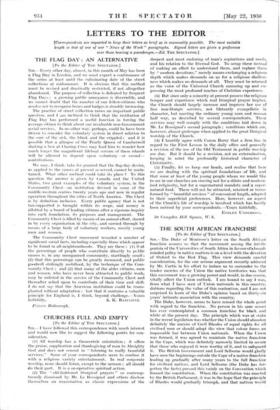CHURCHES FULL AND EMPTY
[To the Editor of THE SPECTATOR.] SIR,—I have followed this correspondence with much interest and would now like to suggest the following points for con- sideration.
(1) All worship has a theocentrie orientation ; it offers the praise, supplication and thanksgiving of man to Almighty God and does not consist in listening to really beautiful services." Some of your correspondents seem to confuse it with a religious variety entertainment. In real corporate worship, none should listen, except to the sermon ; all should do their part. It is a co-operative spiritual action.
(2) The " old-fashioned liturgical prayers " so contemp- tuously dismissed by Mr. Le Rossignol and. others disclose themselves on examination as classic expressions of the
deepest and most enduring of man's aspirations and needs, and his relation to the Eternal God. To scrap these instead of making an effort to understand them, and replace them by " modern devotions," merely means exchanging a religious depth which makes .demands on us for a religious shallow- ness which makes no, demands at all. They must be retained as the voice of the Universal Church summing up and ex- pressing the most profound reaches of Christian experience.
(3) But since only a minority at present possess the religious temper and experience which real liturgical prayer implieS, the Church should largely increase' and improve her use of free non-liturgic services, not blatantly. evangelistic in character, but meeting the ordinary young man and woman half way, as described by several correSpondents. -Thee services may well comply with the conditions laid down in Mr. Le Rossignol's second Paragraph ; conditions which are, however, almost grotesque when applied to the great liturgical worship Of the Church.
(4) I heartily agree with Canon Barry that a firm line in regard to the First Lesson in the daily office' and general/Y a revision of the use of the Old Testament in public worship are due. But it 'should be a revision, not an extermination, keeping in mind the profoundly historical character of Christianity.
(5) Finally, let us keep our heads, and realise that here we are dealing with the spiritual foundations of life, and that some at least of the young people whom we would like to see in our churches are craving not for a- dilute and modern- ised religiosity, but for a supernatural mandate and"a super- natural food. These will not be attracted, retained or trans- formed by " beautiful services " of convenient length, adapted to their superficial preferences. Here, however, an aspect of the Church's life of worship is involved .which has hardly been noticed by your corresporidents.—Yours faithfully, 50 Campden Hill Square, 11'. S.
EVELYN UNDERHILL.


















































 Previous page
Previous page